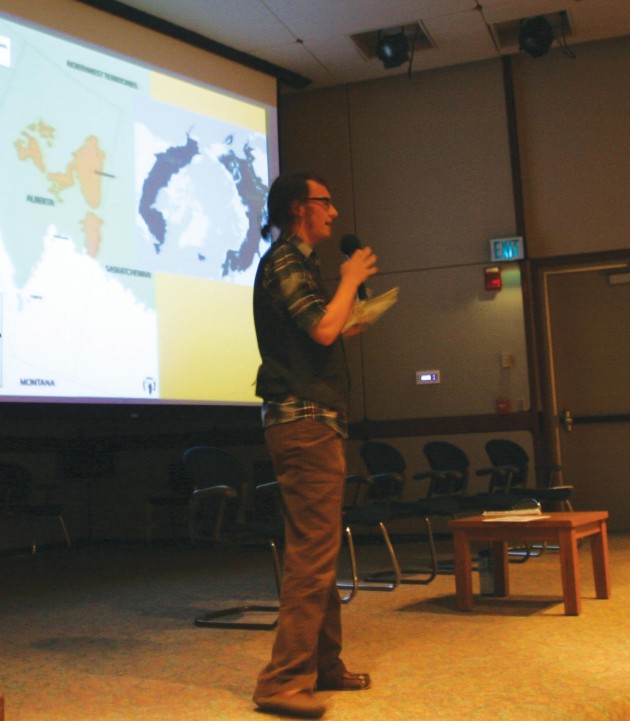
Tyler Hess, a former DePauw student and current University of Kentucky junior, returned to DePauw's campus Sunday night to advocate. This time it was not for banning bottled water, but for banning the Keystone XL pipeline.
A panel of professors, including Michele Villinski, Ken Fortino, Rich Cameron and Jeanette Pope, led a discussion along with Hess on the potential implications of installing the Keystone XL pipeline, which would transport oil from tar sand mines in central Canada to Texas.
Hess returned to discuss the issue of protests in regards to the pipeline, along with the faults of the proposed construction. He was arrested earlier this month along with two DePauw staff members in front of the White House during a protest.
Hess discussed the presence of activism at DePauw and the ways in which it affected the awareness towards the tar sands pipeline conflict.
"Activism at DePauw is unfortunately typical in that some people try very hard, but it's just not that effective," Hess said. "And it's not that like the rest of campus supports the tar sands, but it's the disinformation conveyed to the general public, and when you log on to Yahoo to check your email there are no stories about any of the problems that we discussed tonight."
Junior Chloe Lawson and sophomores Megan Agnew and Camille Veri attended the discussion and felt the event gave off an optimistic message.
"I definitely came out with a positive view of the issue," Agnew said. "They could have given it a negative connotation as to ‘oh, we're all doomed,' but they made it into this more positive, ‘this is what you can do, there's actions going on right now to help and to make things better than what they currently are.'"
Lawson agreed that negativity surrounding issues of activism prevents some people from taking action. She also said a sense of self-interest in the majority of the student body furthers the lack of activism at DePauw.
"And that's the problem with our generation," Lawson said. "We're constantly fed all of this negative information, and we're just knocked down here and again, and we need to start being positive."
Hess and Coordinator of Access Services Mandy Henk discussed their experiences with social disobedience in Washinton D.C., where both were arrested as part of the Tar Sands Action movement.
"The situation that I was involved in I think helped [the audience] understand these larger frameworks and images and gave it a specific example," Hess said.
Slides of tar sands mining grounds in Canada juxtaposed with green forests that once occupied the land were interlaced with the shared experiences of Hess and Henk. Hess repeatedly displayed the slides throughout the presentation to substantiate his claims that tar sand mines create environmental destruction.
"This room was well packed for its size, but it's imperative that this discussion happen on a larger framework amongst an institution of ‘higher learning,'" Hess said.
The panel of professors discussed the negative implications of the pipeline from the perspective of each of their disciplines.
Villinski, a professor of economics, addressed the claims of supporters for the pipeline who insist it will create more jobs and reap economic benefits. She believes there are many other opportunities for creating jobs without the negative environmental effects.
Junior Ashley Isaac supported the issue of economic benefit posed by the pipeline and questioned the group as to how creating such a great number of jobs would be so problematic. Multiple raised voices responded to her questions.
"I felt kind of attacked by certain people but then there was also great insight," Isaac said. "So I'm glad I raised it, because it clearly needed to be said. "But not everything from this pipeline is going to be bad I don't think."
Following the discussion, Hess said he encouraged Isaac to question the panel in order to represent the proponents for the pipeline.
"She brings up the greatest point that the opposition to the pipeline brings up," Hess said. "That's a topic that everyone is going to hear outside of this room when they leave this room, and they wont know how to think about it if they leave this room and don't hear our response."
Isaac continued to support the ideas she posed during the discussion and explained that her experience working at the White House over the summer, specifically at a meeting to mark up the senate bill proposing the implementation of the pipeline, alerted her to the benefits of the pipeline.
"Their points were great," Isaac said. "I mean yeah, it's going to kill the environment, but I see a lot of things killing the environment right now. The environment's not necessarily gone, but if you're going to lower gas prices right now that's a huge thing."
Upon mention of the current deterioration of the environment, Henk said she feels the environment is far from "doom."
"I do not believe that we have lost the environment," Henk said. "We may have reached a couple of tipping points, but the world isn't over yet."
Cameron, a professor of philosophy, answered the question, ‘What would a just society do in this situation,' saying, "Put a price on it, and a high one." To which he received applause from the audience.
Following the discussion students and faculty, as well as those in attendance, were encouraged to continue opposing the issue and following the Tar Sands Action movement.
